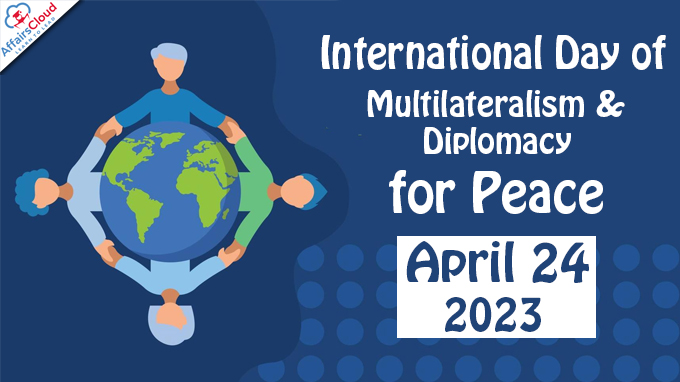
The United Nations(UN)’s International Day of Multilateralism and Diplomacy for Peace is annually observed across the globe on 24th April to raise awareness about preserving the values of multilateralism and global cooperation to maintain peace laid out in the UN’s charter and to achieve the Sustainable Development Goals (SDGs) by 2030.
- This day aims to tackle global issues such as climate change, geopolitical tensions, and humanitarian crises.
- To promote and support the three pillars of the UN which are: peace and security, development, and human rights.
Note: The Sustainable Development Goals (SDGs), also known as the Global Goals, were adopted by the UNs in 2015 as a universal call to action to end poverty, protect the planet, and ensure that by 2030 all people enjoy peace and prosperity.
Background:
i. The United Nations General Assembly (UNGA) on 12 December 2018 adopted the resolution A/RES/73/127 and proclaimed 24th April of every year as the International Day of Multilateralism and Diplomacy for Peace with effect from the 73rdsession of the General Assembly.
ii. The International Day of Multilateralism and Diplomacy for Peace was first observed on 24 April 2019.
United Nations efforts:
i. The Commitment to multilateralism and international peace and security was also reaffirmed by most world leaders in the General Debate in September 2018.
ii. This commitment was also reinforced in the discussion during the High-level Dialogue on Renewing the Commitment to Multilateralism on 31 October 2018.
History:
i. Since the conclusion of the First World War in 1918, the need to promote peace on a global scale became a priority for all nations, and the first step was to establish an organisation that would fulfil this responsibility.
ii. The League of Nations was the first intergovernmental organisation charged with maintaining international peace. After World War I, the Paris Peace Conference established it on January 1919 at Versailles, Paris in France.
iii. The league was dissolved after 26 years because it was unable to withstand aggressions from the Axis Powers (Coalition headed by Germany, Italy, and Japan) during World War II.
iv. The dissolution of the League of Nations in 1945 marked the establishment of the UNs, immediately following World War II, with an initial membership of fifty-one states, founded for the singular purpose of preserving international peace and security and fostering goodwill among nations.
Multilateralism:
i. Multilateralism is the concept in which the UN was established. It is the union or alliance of multiple countries toward a common goal. It is anti-unilateralism, meaning even the smallest powers are given a voice in global matters.
ii. The UN has become the most visible symbol for multilateralism, and the foundation for the creation of other multilateralism efforts such as the World Health Organization (WHO), the World Bank, the World Trade Organization (WTO), and even the North Atlantic Treaty Organization (NATO).
About United Nations:
Established on: 24 October 1945
Secretary-General: António Guterres
Headquarters: New York City, United States of America (USA)




